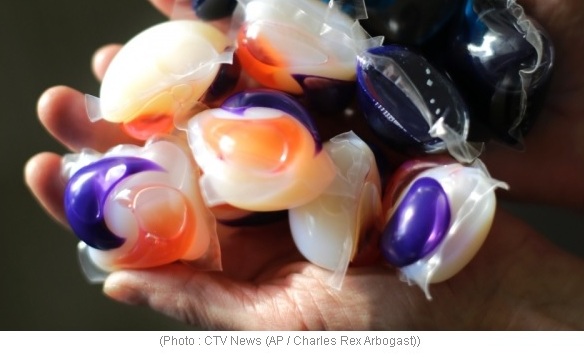Soap Pod Poisonings Are On The Rise
June 15, 2015 | Category: Defective Products, Wrongful Death | ShareConvenient single-use laundry detergent “pods” are causing a rising rate of poisoning. As reported in the Wall Street Journal in May 2015, at least seven people, children and adults with dementia, have died after biting into the single-dose laundry pods this year alone.
WHAT ARE DETERGENT PODS?
Detergent pods are single-load laundry detergent pods which were introduced to the U.S. market in 2010. Detergent pods are brightly colored, single-use packets of highly concentrated detergent which is enclosed in a water-soluble membrane which dissolves in the wash. When the pods are mixed with liquids, the detergent is released. Pods are sold under the names of Tide Pods, Purex Ultra Packs, All Mighty Pacs and other brands.
Young children and some senior adults can easily mistake the detergent pods for candy or toys because of their brightly colored, flexible packaging. A large quantity of concentrated chemicals can be ingested when pods are put in mouths.
 HOW WIDESPREAD IS THE PROBLEM?
HOW WIDESPREAD IS THE PROBLEM?
In 2015, accidental exposures involving children under six have been reported to U.S. poison centers at a rate of roughly 30 a day. While that is down from about 32 a day last year, poison-control experts are worried that the rate and severity of accidental exposures remains high three years after the product’s introduction in the U.S.
WHAT ARE THE SYMPTOMS?
Because of their concentrated nature, laundry pod soaps pose a greater risk of significant harm than other detergents. In May 2012, the U.S. Centers for Disease Controls (CDC) and the American Association of Poison Control Centers (AAPCC) began tracking laundry detergent pod poisoning due to the increasing number of reports of children 5 and under becoming ill after ingesting the packets.
Children who ingested the pods were hospitalized due to:
- Loss of consciousness
- Excessive vomiting
- Drowsiness
- Throat swelling
- Difficulty breathing (requiring intubation)
- Severe eye irritation
- Temporary loss of vision due to ocular burns
The AAPCC reports that children who suffered laundry detergent pod poisoning either swallowed the packet, bit into a pack and swallowed a mouthful, or bit into a packet and breathed the product into their lungs and rapidly developed symptoms that required hospitalization.
WHAT IS BEING DONE ABOUT THE PROBLEM?
A nationwide study, published in the December 2014 issue of Pediatrics, the official journal of the American Academy of Pediatrics, found 17,230 children under 6 were exposed to laundry detergent pods from 2012 to 2013, and children under 3 accounted for nearly 74 percent of the cases reported. The study reported that the most common exposure was through ingestion. The most common side-effects displayed by children exposed to the pods were drowsiness or lethargy, vomiting, choking, eye pain or irritation and conjunctivitis (red eye). The study concluded that increased efforts are needed, such as improving packaging and labeling of the products, to prevent exposure of young children to laundry detergent pods. At the same time, The New York Times reported in November 2014 that parents and consumer agencies have called for laundry detergent manufacturers to change their products’ packaging to make it harder for young children to open.
Shortly after the call was made for manufacturers to redesign their packaging, Proctor & Gamble changed its Tide Pods packaging in 2012 to make it harder for young children to open. The following year, Proctor & Gamble replaced its Tide Pods clear plastic bags and tubs with opaque plastic, making it more difficult for children to see the colors. In addition, the American Cleaning Institute (ACI) announced in November 2014 that its organization, which includes detergent manufacturers, were addressing the laundry detergent pod dangers. Despite new packaging, Fox News Insider reported May 18, 2015 that laundry pod poisonings continue.
WHAT CAN PARENTS DO?
CBS News reported that parents need to be just as careful about locking up detergent pods as they are with bleach, drain cleaner and other toxic household chemicals.
The experts at local poison centers urge parents and caregivers to:
- Always keep detergent containers closed, sealed and stored up high, out of the reach of children.
- Follow the instructions on the product label.
- Call the local poison center at 1-800-222-1222 immediately if you suspect a child has come in contact with detergent.
If your child or loved one has suffered a serious injury because of a laundry pod, the experienced personal injury lawyers at the Spivey Law Firm, Personal Injury Attorneys, P.A. can provide answers to your legal questions. We will inform you of the legal rights you and your child(ren) possess, including potential claims for damages against the manufacturer for your child's pain and suffering, and past and future medical expenses.
Lee, Collier and Charlotte County Child Injury Attorney, Randall L. Spivey is a Board Certified Trial Attorney – the highest recognition for competence bestowed by the Florida Bar and a distinction earned by just one (1%) percent of Florida attorneys. He has handled over 2,000 personal injury and wrongful death cases throughout Florida. For a free and confidential consultation to discuss your legal rights, contact the Spivey Law Firm, Personal Injury Attorneys, P.A., in Lee County at 239.337.7483 or toll free at 1.888.477.4839,or by email to Randall@SpiveyLaw.com. Visit SpiveyLaw.com for more information. You can contact Spivey Law Firm, Personal Injury Attorneys, P.A.in Charlotte County at 941.764.7748 and in Collier County 239.793.7748.

